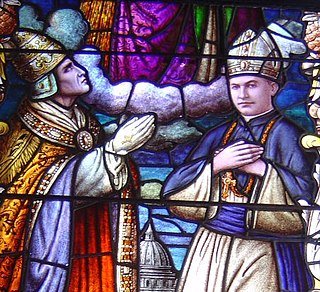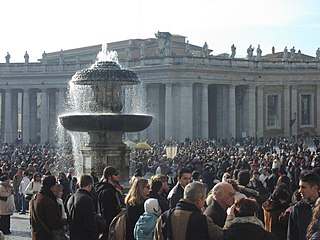The highest-ranking bishops in Eastern Orthodoxy, Oriental Orthodoxy, the Catholic Church, the Hussite Church, Church of the East, and some Independent Catholic Churches are termed patriarchs.

A prelate is a high-ranking member of the Christian clergy who is an ordinary or who ranks in precedence with ordinaries. The word derives from the Latin praelatus, the past participle of praeferre, which means 'carry before', 'be set above or over' or 'prefer'; hence, a prelate is one set over others.
An apostolic see is an episcopal see whose foundation is attributed to one or more of the apostles of Jesus or to one of their close associates. In Catholicism, the phrase "The Apostolic See" when capitalized refers specifically to the See of Rome.
In Christianity, minor orders are ranks of church ministry. In the Catholic Church, the predominating Latin Church formerly distinguished between the major orders—priest, deacon and subdeacon—and four minor orders—acolyte, exorcist, lector, and porter. In 1972, the Vatican re-titled the minor orders as "ministries", with those of lector and acolyte being kept throughout the Latin Church. In the Eastern Orthodox Church, the three minor orders in use are those of subdeacon, reader and chanter.

In the Catholic Church, a religious order is a community of consecrated life with members that profess solemn vows. They are classed as a type of religious institute.

An ordinary is an officer of a church or civic authority who by reason of office has ordinary power to execute laws.
The hierarchy of the Catholic Church consists of its bishops, priests, and deacons. In the ecclesiological sense of the term, "hierarchy" strictly means the "holy ordering" of the church, the Body of Christ, so to respect the diversity of gifts and ministries necessary for genuine unity.
Ecclesia Dei is the document Pope John Paul II issued on 2 July 1988 in reaction to the Ecône consecrations, in which four priests of the Society of Saint Pius X were ordained as bishops despite an express prohibition by the Holy See. The consecrating bishop and the four priests consecrated were excommunicated. John Paul called for unity and established the Pontifical Commission Ecclesia Dei to foster a dialogue with those associated with the consecrations who hoped to maintain both loyalty to the papacy and their attachment to traditional liturgical forms.
Validity and liceity are concepts in the Catholic Church. Validity designates an action which produces the effects intended; an action which does not produce the effects intended is considered "invalid". Liceity designates an action which has been performed legitimately; an action which has not been performed legitimately is considered "illicit". Some actions can be illicit, but still be valid.

Consecrated life is a state of life in the Catholic Church lived by those faithful who are called to follow Jesus Christ in a more exacting way. It includes those in institutes of consecrated life, societies of apostolic life, as well as those living as hermits or consecrated virgins.
A society of apostolic life is a group of men or women within the Catholic Church who have come together for a specific purpose and live fraternally. It is regarded as a form of consecrated life.
An institute of consecrated life is an association of faithful in the Catholic Church canonically erected by competent church authorities to enable men or women who publicly profess the evangelical counsels by religious vows or other sacred bonds "through the charity to which these counsels lead to be joined to the Church and its mystery in a special way". They are defined in the 1983 Code of Canon Law under canons 573–730. The Congregation for Institutes of Consecrated Life and Societies of Apostolic Life has ecclesial oversight of institutes of consecrated life.
The canon law of the Catholic Church is "how the Church organizes and governs herself". It is the system of laws and ecclesiastical legal principles made and enforced by the hierarchical authorities of the Catholic Church to regulate its external organization and government and to order and direct the activities of Catholics toward the mission of the Church. It was the first modern Western legal system and is the oldest continuously functioning legal system in the West, while the unique traditions of Eastern Catholic canon law govern the 23 Eastern Catholic particular churches sui iuris.
In the Catholic Church, an association of the Christian faithful or simply association of the faithful, sometimes called a public association of the faithful, is a group of baptized persons, clerics or laity or both together, who, according to the 1983 Code of Canon Law, jointly foster a more perfect life or promote public worship or Christian teaching, or who devote themselves to other works of the apostolate.

In the Catholic Church, a bishop is an ordained minister who holds the fullness of the sacrament of holy orders and is responsible for teaching doctrine, governing Catholics in his jurisdiction, sanctifying the world and representing the Church. Catholics trace the origins of the office of bishop to the apostles, who it is believed were endowed with a special charism and office by the Holy Spirit at Pentecost. Catholics believe this special charism and office has been transmitted through an unbroken succession of bishops by the laying on of hands in the sacrament of holy orders.

The 1983 Code of Canon Law, also called the Johanno-Pauline Code, is the "fundamental body of ecclesiastical laws for the Latin Church". It is the second and current comprehensive codification of canonical legislation for the Latin Church of the Catholic Church. The 1983 Code of Canon Law was promulgated on 25 January 1983 by John Paul II and took legal effect on the First Sunday of Advent 1983. It replaced the 1917 Code of Canon Law which had been promulgated by Benedict XV on 27 May 1917. According to canon 6, the 1983 code of canon law abrogates the 1917 code of canon law and any penal laws made under it that are not contained in the 1983 code.
Precedence signifies the right to enjoy a prerogative of honor before other persons; for example, to have the most distinguished place in a procession, a ceremony, or an assembly, to have the right to express an opinion, cast a vote, or append a signature before others, to perform the most honorable offices.
This is a glossary of terms used within the Catholic Church. Some terms used in everyday English have a different meaning in the context of the Catholic faith, including brother, confession, confirmation, exemption, faithful, father, ordinary, religious, sister, venerable, and vow.

Catholic laity are the ordinary members of the Catholic Church who are neither clergy nor recipients of Holy Orders or vowed to life in a religious order or congregation. Their mission, according to the Second Vatican Council, is to "sanctify the world".
In the canon law of the Catholic Church, exclaustration is the official authorization for a member of a religious order bound by perpetual vows to live for a limited time outside their religious institute, usually with a view to discerning whether to depart definitively.







